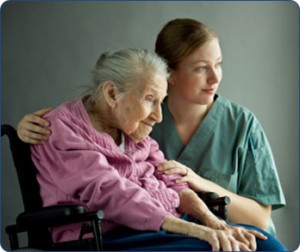 About one in ten American adults, or approximately 44 million people who provide unpaid care to another adult, are caregivers to a loved one. Some of that care is episodic, some of it is around the clock and the rest is at all the points in between. The Family Caregiver Alliance estimates that this work force of volunteers provides about 80 percent of the long term geriatric care management in America today. So, the vast majority of Americans who are receiving long term care support are doing so with the help of a family member or friend. But these 44 million people are not an “industry,” so the result is one potential crisis at a time while all of these volunteers cope with the stresses of finding time in their days and the resources to care for a loved one.
About one in ten American adults, or approximately 44 million people who provide unpaid care to another adult, are caregivers to a loved one. Some of that care is episodic, some of it is around the clock and the rest is at all the points in between. The Family Caregiver Alliance estimates that this work force of volunteers provides about 80 percent of the long term geriatric care management in America today. So, the vast majority of Americans who are receiving long term care support are doing so with the help of a family member or friend. But these 44 million people are not an “industry,” so the result is one potential crisis at a time while all of these volunteers cope with the stresses of finding time in their days and the resources to care for a loved one.
Unlike the professionals in long term care facilities, the family or friends who volunteer for caregiving typically do not have the professional education or experience on which to draw. Here are nine strategies that will help make for a successful effort for all concerned:
- Start with normal. If the caregiver has not been in the loved one’s inner circle, it will be important to establish a baseline of “this is what mom is like/needs.”
- Get a complete physical. This is a medical way to understand where you are starting and what care or treatment is appropriate.
- Be informed. Once you have the baseline and any diagnoses learn as much as you can about the conditions, their prognoses and treatments.
- Make a plan. This should cover the activities of daily living and more: hygiene, housekeeping, medical care, emotional support and ongoing supervision.
- Revise and evolve. A plan is not a static set of instructions like a recipe; it is a work in progress that you will revisit regularly as conditions change.
- Talk to an attorney. You need to be aware of a loved one’s financial resources as well as any legal paperwork in place or needed.
- Elder-proof the home. An older adult as well as an aging household can pose a safety hazard; search this blog for key words like safe home, safety, etc.
- It takes a village. You are one of 44 million caregivers, and you will benefit from the group support and understanding that will come from talking to others.
- Care for the caregiver. You deserve caring every bit as much as your older loved one, and you cannot care for another if you neglect yourself.
For more information and resources, I strongly recommend the Family Caregiver Alliance website, or do a keyword search of our blog here using the word “caregiver.”
Charlotte Bishop is a Geriatric Care Manager and founder of Creative Care Management, certified elder care management professionals who are geriatric advocates, resources, counselors and friends to older adults and their families in metropolitan Chicago. Please email your questions to info@creativecaremanagement.com.



